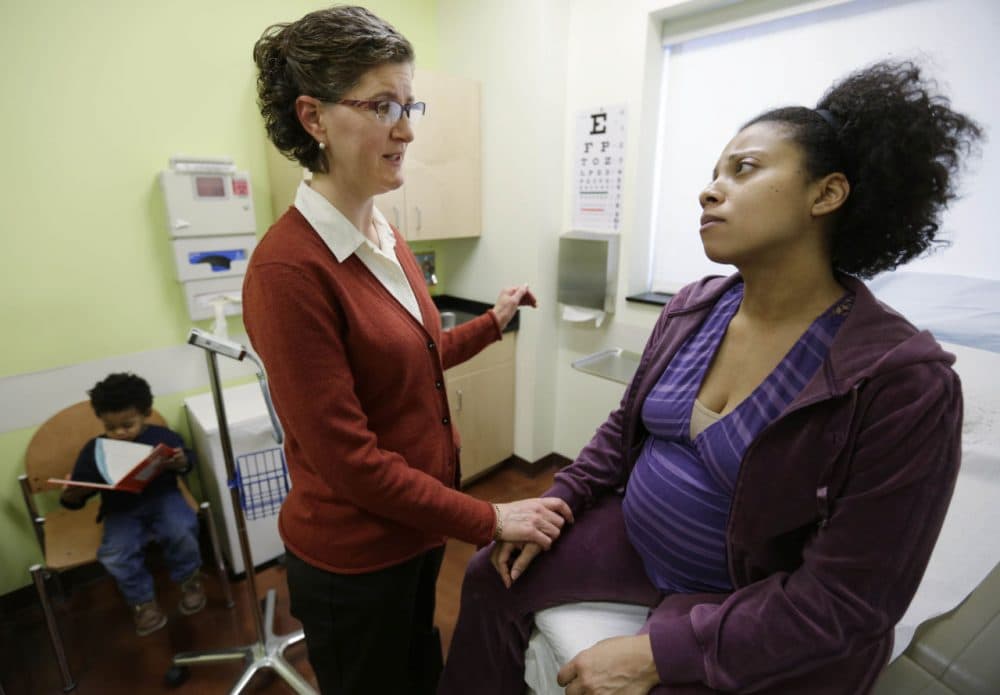Advertisement
For Some Women, Better Birthing May Be Outside Hospitals
Resume
Earlier this year, Britain's top health care group issued surprising new recommendations for pregnancy and childbirth. The UK's National Institute for Health and Care Excellence concluded that healthy women with uncomplicated pregnancies are safer giving birth at home, or in a midwife-led unit rather than in a hospital under the supervision of an obstetrician.
Here in the US, the New England Journal of Medicine — one of the country's most prestigious medical journals — asked Dr. Neel Shah to write a response to the UK recommendations. Shah is an obstetrician at Beth Israel Deaconess Medical Center. After much thought, he wrote a carefully considered and researched commentary in the New England Journal that comes to this conclusion:
Shah writes: "I have little doubt that the United States offers outstanding care for medically complicated pregnancies. But there are lessons to be learned from the British system. The majority of women with straightforward pregnancies may truly be better off in the United Kingdom."
Guest
Neel Shah, M.D., obstetrician at Beth Israel Deaconess Medical Center and an assistant professor at Harvard Medical School. He tweets @neel_shah.
More
- "At its core, this debate is not about the superiority of midwives over doctors or hospitals over homes. It is about treatment intensity and when enough is enough."
Commonhealth: Culture Clash: U.K. Embraces Homebirth As Best For Some Women
- "According to the recommendations, low-risk women having their first child experienced fewer medical interventions at home and in midwife-led units as opposed to obstetric units in the traditional hospital setting. At the same time, the findings determined that babies of first-time mothers were at a slightly higher risk for stillbirth and other complications during homebirths. For second-time mothers, those risks diminished. It’s not entirely clear why there were fewer interventions during homebirths but researchers believe it could have to do with women being more comfortable in the home environment."
- "Advise low‑risk multiparous women that planning to give birth at home or in a midwifery‑led unit (freestanding or alongside [a hospital]) is particularly suitable for them because the rate of interventions is lower and the outcome for the baby is no different compared with an obstetric unit."
American Congress of Obstetricians and Gynecologists: Committee Opinion On Planned Home Birth
- "Although the Committee on Obstetric Practice believes that hospitals and birthing centers are the safest setting for birth, it respects the right of a woman to make a medically informed decision about delivery. Women inquiring about planned home birth should be informed of its risks and benefits based on recent evidence. Specifically, they should be informed that although the absolute risk may be low, planned home birth is associated with a twofold to threefold increased risk of neonatal death when compared with planned hospital birth."
Huffington Post: The U.S. Is The Only Developed Nation With A Rising Maternal Mortality Rate
- "In the U.S., deaths from hemorrhage, sepsis (infection) and abortion (the medical definition of which includes ectopic pregnancy, miscarriage and induced abortion) are on the decline, according to the report. But deaths from medical complications that were either exacerbated by pregnancy or started during pregnancy — things like congenital heart disease, diabetes, obesity and kidney problems, are on the rise. So are combined deaths from embolism, heart failure and anesthesia complications."
Centers for Disease Control and Prevention: Trends In Pregnancy-Related Deaths
- "Since the Pregnancy Mortality Surveillance System was implemented, the number of reported pregnancy-related deaths in the United States steadily increased from 7.2 deaths per 100,000 live births in 1987 to a high of 17.8 deaths per 100,000 live births in 2009 and 2011."
This segment aired on June 17, 2015.